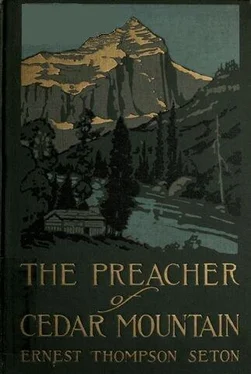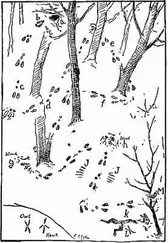Ernest Seton - The Preacher of Cedar Mountain
Здесь есть возможность читать онлайн «Ernest Seton - The Preacher of Cedar Mountain» весь текст электронной книги совершенно бесплатно (целиком полную версию без сокращений). В некоторых случаях можно слушать аудио, скачать через торрент в формате fb2 и присутствует краткое содержание. Год выпуска: 2009, Жанр: Прочие приключения, на английском языке. Описание произведения, (предисловие) а так же отзывы посетителей доступны на портале библиотеки ЛибКат.
- Название:The Preacher of Cedar Mountain
- Автор:
- Жанр:
- Год:2009
- ISBN:нет данных
- Рейтинг книги:3 / 5. Голосов: 1
-
Избранное:Добавить в избранное
- Отзывы:
-
Ваша оценка:
- 60
- 1
- 2
- 3
- 4
- 5
The Preacher of Cedar Mountain: краткое содержание, описание и аннотация
Предлагаем к чтению аннотацию, описание, краткое содержание или предисловие (зависит от того, что написал сам автор книги «The Preacher of Cedar Mountain»). Если вы не нашли необходимую информацию о книге — напишите в комментариях, мы постараемся отыскать её.
The Preacher of Cedar Mountain — читать онлайн бесплатно полную книгу (весь текст) целиком
Ниже представлен текст книги, разбитый по страницам. Система сохранения места последней прочитанной страницы, позволяет с удобством читать онлайн бесплатно книгу «The Preacher of Cedar Mountain», без необходимости каждый раз заново искать на чём Вы остановились. Поставьте закладку, и сможете в любой момент перейти на страницу, на которой закончили чтение.
Интервал:
Закладка:
Hartigan could not have told why he went alone on that walk. He only knew that in this crisis something cried out in him to be alone with the simple big things. Why should the worldly-wise companion he had chosen be left out? He didn't know; he only felt that he wanted no worldly wisdom now. He wished to face the judgment day in his soul all alone. He would not have done so a year before; but the Angel of Destiny had led on an upward trail and now he was brought aside to the edge so that he might look over, and down, and know that he was climbing.
Belle met him at the door. Her face was anxious. But his look reassured her. He took her on his knees as one might lift a child and, sitting with his arm around her and gazing far away, he said: "I had a landslide, Belle. All my church thought and training were swept away in a moment. I was floundering, overwhelmed in the ruin, when I found a big, solid, immovable rock on which I could build again. It was not the Church, it was my mother gave it to me. She used to say: 'Don't try to reason it all out; no one can. Only try to do as the Master would do'; what that is we are not always sure; but one who followed Him has told us, 'Keep cool and kind and you won't go far astray.'"
She looked into his face and saw something that she had never seen there before. The thought that flashed through her mind was of Moses and how his countenance showed that a little while before he had talked with God. She was awed by this new something he had taken on; and her instinct hushed the query that arose within her. She only gripped his hand a little and looking far away, said slowly: "There are times when He comes to talk with His own. I think he wanted to walk with you alone by the lake and talk, as He one time walked with His men on the shore of Galilee."
"My mind is clear now, Belle," he continued, "if these people want me to begin here merely as orthodox pulpit preacher, I must give up the post. That is what I want to be, but this is not the time or place for it. If, on the other hand, they will let me try to help those who need help, and in the form in which they need it—well and good; I will do my best to understand and meet the problems. But we must at once have a clear understanding."
She put her arms about him and after a little silence said: "I am with you to the finish, Jim. I know you have received a message and have guidance as to how it should be delivered."
It was in the little flat, with sagebrush in the vases, that they thought it out, and reached a solution that was the middle of the road. The first presentation of his new understanding Jim made to the Board of Deacons two days later. He said:
"When a man is swimming for his life, he does not want to discuss politics. When a man's children are hungry, he can't be expected to respect the law that prevents him from feeding them. When a man has no property, you needn't look to him for a fine understanding of the laws of property. When a man has no chance for lawful pleasures in life, he cannot be blamed much for taking any kind that comes within reach. When a man's body is starved, cold, and tormented, he is not going to bother about creeds that are supposed to guide his soul."
"All of which we freely admit," said Mr. Hopkins, with characteristic gravity. "The problems that you name are very real and grave, but they are the problems of the nation. Rest assured that every man of force in America to-day is aware of these things, and is doing all he can to meet them squarely. Moreover, they are being met with success—slow, but continued success.
"Are you prepared to outline the plan by which you would contribute to the local solution of these national problems?"
Yes, Hartigan had it there on paper. "I must approach these people through the things which they know they need. They don't feel any need of a church, but they do feel the need of a comfortable meeting place where the wholesome love of human society may be gratified. Their lives are devoid of pleasure, except of the worst kinds. This is not choice, but is forced on them; there is not a man, woman or child among them that does not—sometimes, at least—hunger for better things—that would not enjoy the things that you enjoy, if they had the chance. I want harmless pleasures in abundance put within their reach.
"Man is an animal before he is a soul; so I would begin by providing the things needful for a body. All men glory in physical prowess; therefore I want a gymnasium, and with it, the natural accompaniments of bath house and swimming tank. In short, I don't want a church; I want an up-to-date People's Club, with a place for all and a welcome for all."
The deacons sat back and gazed at one another. "Well," said Deacon Starbuck, president of the Stock Bank, "you surely have a clear-thinking business head among your gifts."
There was a distinct split in the views of the Board. The older men objected that this was an organization for propagating the Gospel of Christ, not for solving economic problems, and proved with many Scripture texts that we must "first of all seek the Kingdom of God and His righteousness," after having secured which, the rest would follow.
But the younger men took Hartigan's view that it was no time to talk politics to a man when he was swimming for his life. Fortunately, Hopkins was able to stave off action, pending a fuller discussion, and brought that on at once.
"Let us understand. Is the club to be a charity, a benevolence, or a business proposition—that is, a free gift, a partly supported institution, or a dollar-for-dollar bargain?"
The older men believed in charity. Jim opposed it as wrong in principle. As a business proposition it was hopeless, at present; so he definitely labelled it a "benevolence."
"All right," said Hopkins, "now how much money do you want, and how long to make good?"
Again Jim referred to the paper in his hand.
"I want twenty-five thousand dollars cash to provide and equip a temporary building; I want five thousand a year to run it, and I want one thousand dollars a year salary paid to my wife, who is with me in all things, and will give all her time to it. I want three years to make good, that is to make a noticeable reduction in drink and crime, which is the same thing, and this we shall gauge by the police records. By that time I shall have fifteen hundred families in touch with the club, paying dues to it. I shall stand or fall by the result. If I satisfy you, I shall ask for a hundred-thousand-dollar building at the end of that time."
"You say nothing about street sermons," said a plaintive old gentleman with a long white beard and the liquid eyes of an exhorter.
"No, not one. I don't want them. I can work better indoors."
The president said, "Well, Mr. Hartigan, perhaps it would be well for you to retire, in order that we may freely discuss your plan. As you seem to have it on paper, would you mind leaving the document?" Jim hesitated, glanced at it, then handed it to Mr. Hopkins. It was all in a woman's hand.
In fifteen minutes, Jim was summoned to learn the decision. They accepted, not unanimously, but they accepted his entire proposition, with the exception of one item; they would not pay salary to or officially recognize his wife. It was a bitter pill, and Jim's eyes were brimming with tears and his face flushed at the injustice when he went home to tell her. Poor little woman! Her lips tightened a trifle, but she said: "Never mind, I'll work for it just the same. I'm afraid they are still in the Dark Ages; but the light will come."
CHAPTER LII
The Boss
It had been a private dwelling, far out on the prairie once, but the hot, steady lava flow of the great city had reached and split and swept around the little elevated patch of grimy green with its eleven despairing trees. A wooden house it was, and in the very nature of it a temporary shift; but the committee—Hopkins, Hartigan, and Belle—felt it worth looking into.
Читать дальшеИнтервал:
Закладка:
Похожие книги на «The Preacher of Cedar Mountain»
Представляем Вашему вниманию похожие книги на «The Preacher of Cedar Mountain» списком для выбора. Мы отобрали схожую по названию и смыслу литературу в надежде предоставить читателям больше вариантов отыскать новые, интересные, ещё непрочитанные произведения.
Обсуждение, отзывы о книге «The Preacher of Cedar Mountain» и просто собственные мнения читателей. Оставьте ваши комментарии, напишите, что Вы думаете о произведении, его смысле или главных героях. Укажите что конкретно понравилось, а что нет, и почему Вы так считаете.




